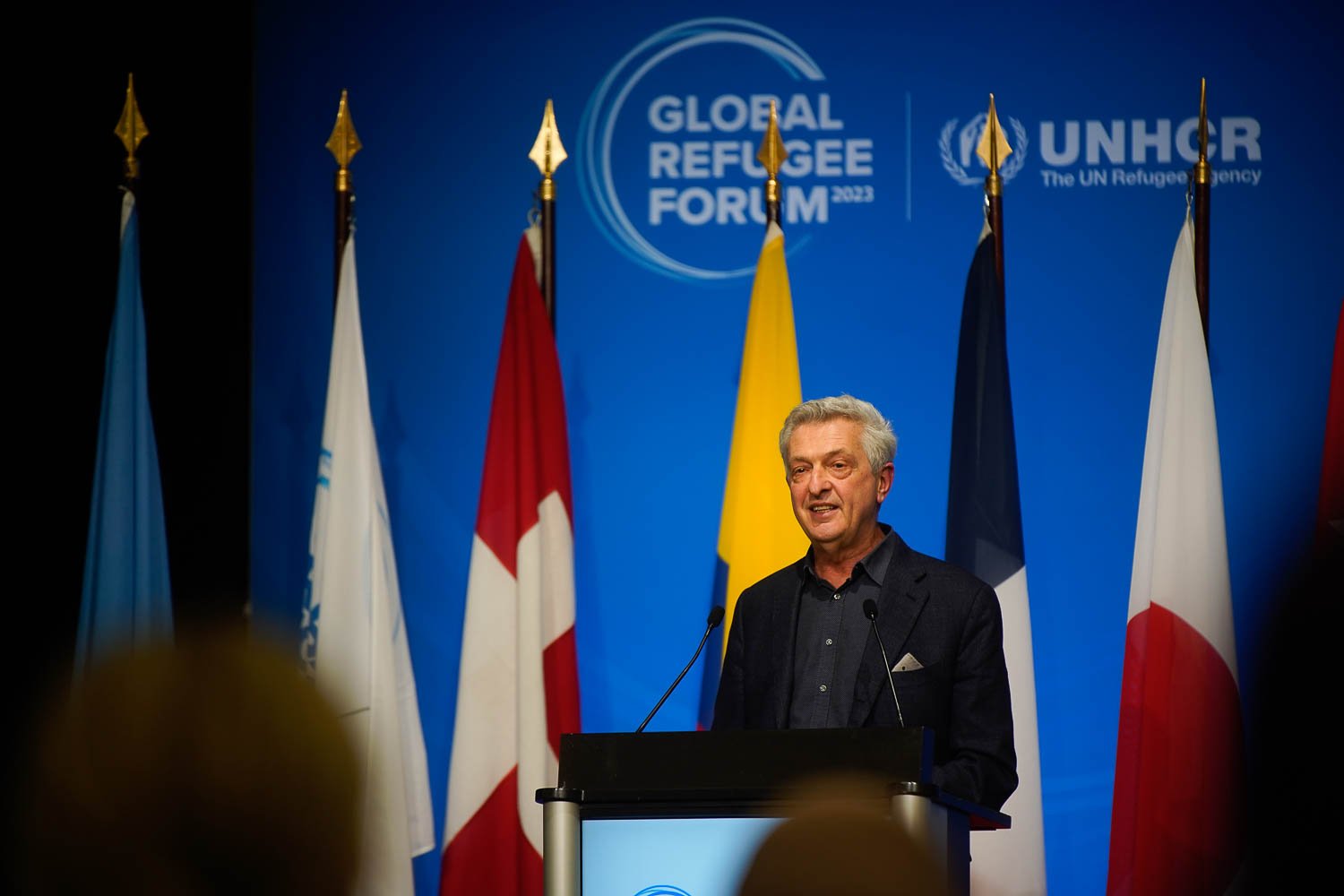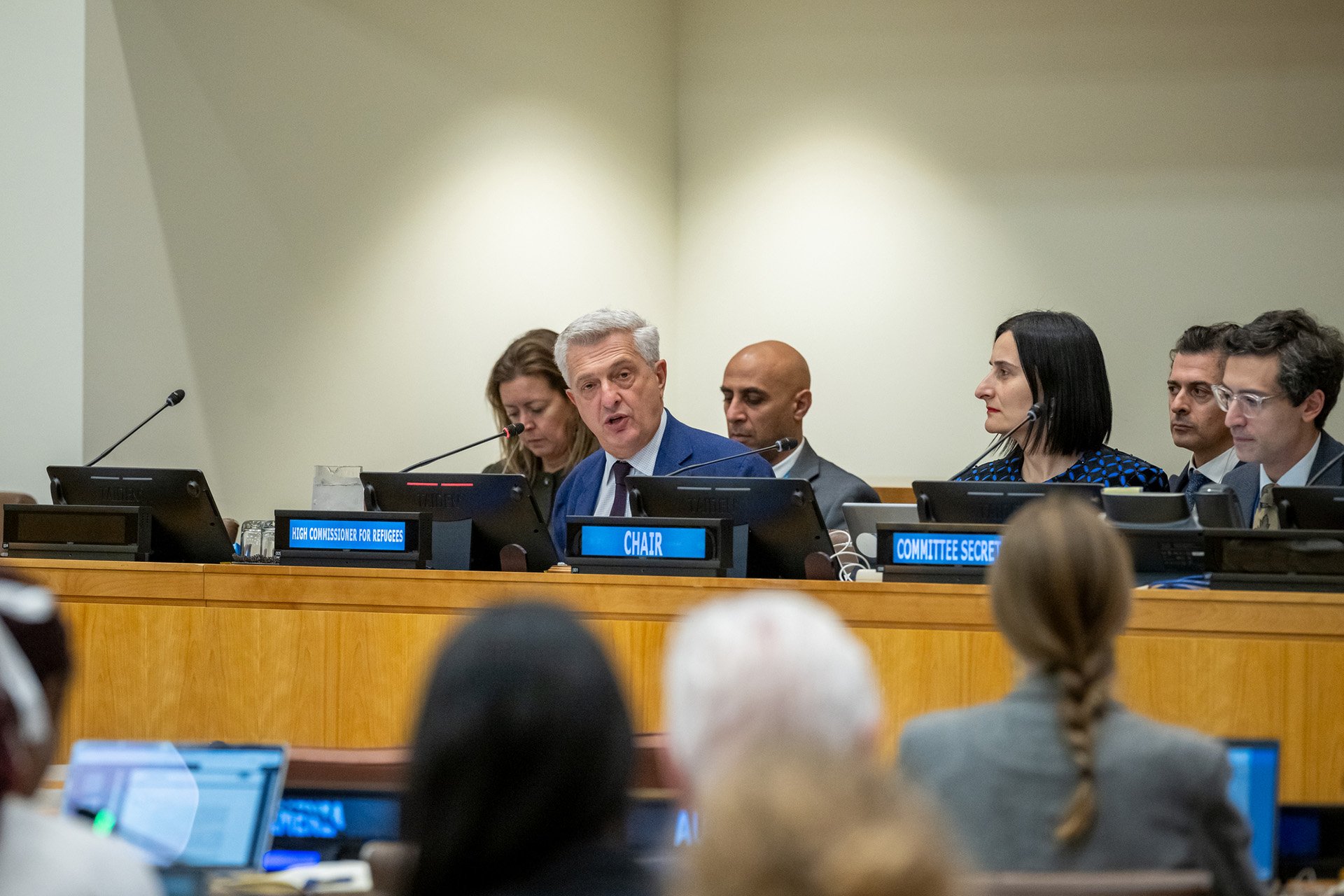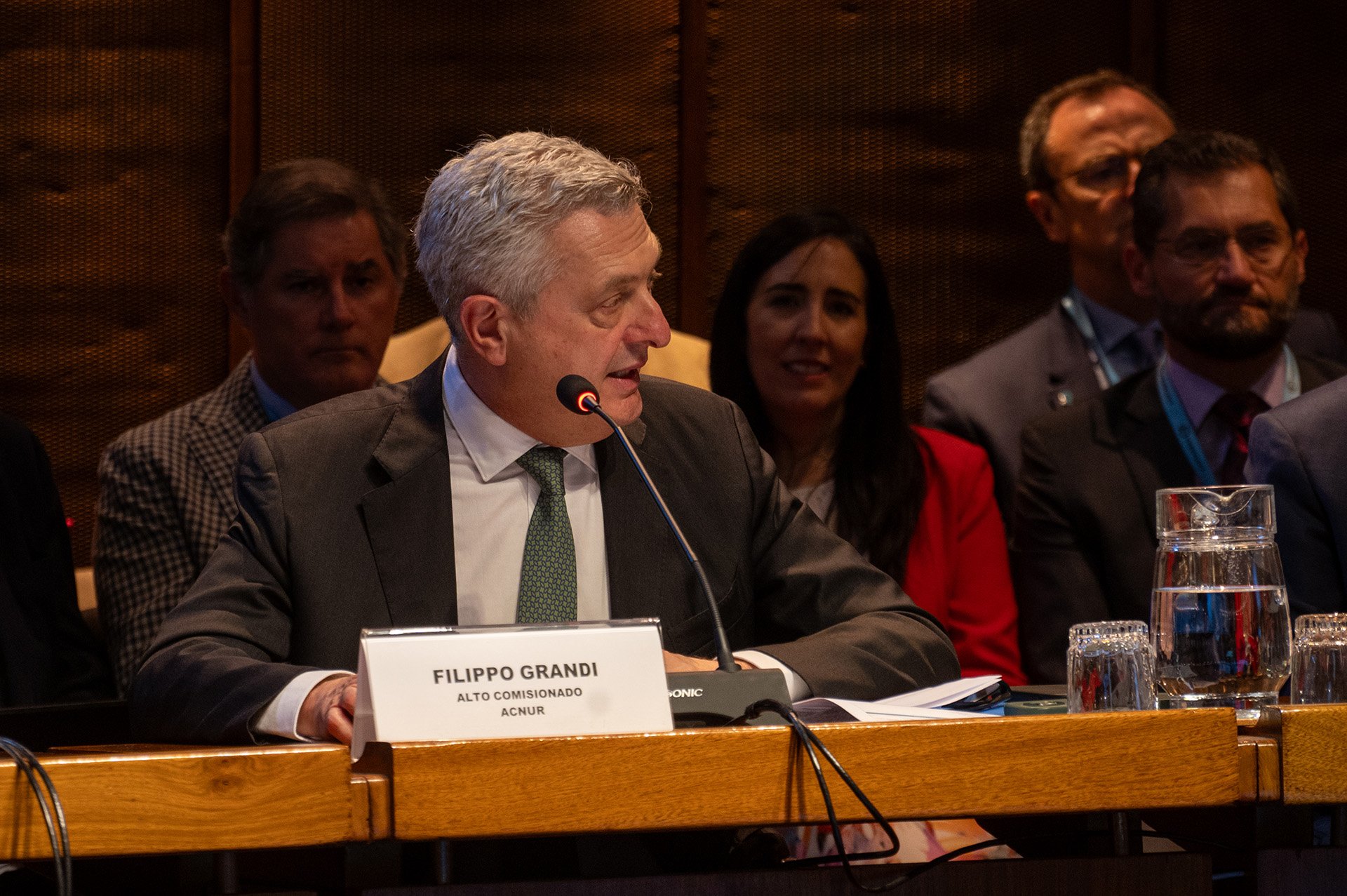Global Refugee Forum 2023 Closing Statement by the UN High Commissioner for Refugees Filippo Grandi
Global Refugee Forum 2023 Closing Statement by the UN High Commissioner for Refugees Filippo Grandi

UN High Commissioner for Refugees Filippo Grandi speaks at the closing plenary of the Global Refugee Forum in Geneva.
Friends,
My thanks to you all for participating in this Global Refugee Forum. I have been extremely pleased – proud, if I may say – to have been part of the rich discussions here over these past three days; to have been infected by the energy that you have brought to this event; and to have been inspired by the work of so many of you.
This work is so, so necessary. For the world – as you know – continues to confront deeply troubling times.
During the three days we have been here, scores of civilians in Gaza have been killed. Many more have been displaced into an already impoverished corner of an already tiny sliver of land. The violence must stop. There must be a humanitarian cease fire now. And like the Secretary-General just said, aid must be allowed into Gaza to reach civilians with the speed and quantity that they need and deserve. Hostages must be released. And I want to be clear: what is already a massive displacement crisis must not turn into yet another refugee crisis.
While we were here, grave milestones were reached elsewhere in the world. More than 700,000 people have been displaced by fighting in Myanmar since the end of October alone, bringing the total number of IDPs in that country to more than 2.5 million.
And the seven millionth person was displaced by the brutal fighting in Sudan. Think about that: what level of violence and horrors does it take to force seven million people from their homes in just eight months? And with the exception of the host countries and communities – we heard many of them here - that have tried to protect them; to shelter them; to help them, the plight of so many of the displaced has been met largely I’m sorry to say with international indifference. I make the strongest of appeals to the parties to stop the violence now. And I hope that efforts to bring the parties together, including those of IGAD, will be supported and successful.
The state of the world requires a reboot of humanity and energy to meet the challenges before us, including that of forced displacement. And as long as displacement and other humanitarian crises persist, we need an equally large, sustained, and urgent influx of humanitarian resources. Humanitarian agencies and NGOs, dear friends, are facing severe funding shortages, must be supported to scale up their responses around the world to save lives, and also to be able to implement the very work to which you have pledged to make happen over these past days!
And here I make a very special plea for support to UNRWA. Because the desperate needs in Gaza which must be fully funded, but so too must its life saving and life changing programmes and operations elsewhere in the region. Please do everything you can to help. But at the same time, do not let a good response there come at the expense of others.
Friends,
In the months leading up to this Forum, some asked whether the time was right for such an event given that the world is divided and in a dramatic state of disorder. Against this very challenging backdrop, the easy thing would have been for you, for us, to retreat and step back from international commitments or to perhaps to bring your difference and division here.
But you did not. Instead by and large you came in full force and spent three days here most of the time exemplifying determined unity!
4,200 participants from 168 governments and more than 425 organisations came here for this largest multistakeholder event in the world on and with refugees; networking with others in this field and creating what I feel has become a global community dedicated to protecting, helping and solving.
Over 1,600 pledges were made – even more than the last GRF; but what impressed me more than the number of pledges, was their quality – the concrete measures and joined-up commitments that you have all promised to do in the service of refugees and those who host them. To ease pressure on hosts; to enhance refugee self-reliance; to expand third country solutions; and to step up work in countries of origin. The four pillars of the Global Compact.
It has shown the transformative power of multilateralism, grounded in a multistakeholder whole-of-society pledging approach.
I am humbled.
Humbled by these commitments, but even more so by the recognition of so many of you that if we are to truly move the needle on refugee crises, we need to work together. I sat here on this podium for three days; I listened to more than one hundred statements, and - with the exception of one, clearly isolated, delegation that spoke of ‘hypocrisy’ (hypocrisy that I must say lies solely with those who try to block multilateral humanitarian action for political reasons) you all came together with positivity and with unity.
Pledges were made by donors – $2.2 bn in financial pledges. Please keep it up, especially when your financial help can sustain good practices and policies, strong refugee protection, and the quest for solutions.
Pledges were made by the private sector – Committing over $250 million (private sector) in funding pledges, one million pro bono hours, jobs for 100,000 refugees and over 400,000 training opportunities, catalysing over $180 million in investment into refugee-owned, refugee-supporting ventures, and over 6,000 scholarships.
Pledges were made by hosts! And as we heard in the very important statement made by the Vice President of Zambia, let’s not forget that so many of these hosts – already with major refugee populations – did so even when the refugee influxes into their countries continue to be enormous. Think of co-convenor Uganda, having received 85,000 refugees this year alone! Or our former co-convenor, Ethiopia, which has received another 130,000 refugees this year alone. And many others.
Talk about solidarity!
They are not saying no or building walls. They are not earmarking which refugees can enter. Instead these and so many other major host countries made (and also not major host countries) multiple, clear, and concrete pledges here at the GRF, in spite of so many new arrivals – and what do they get in return? Often pleasant words of praise, but too often the information that funding is declining.
Pledges were made by NGOs, international and national; civil society organisations; sports bodies; law firms; faith leaders (with a deeply moving ceremony yesterday – thank you). Pledges were made by more than 100 cities – where most refugees live and where local authorities are not only including, but also working on service delivery even in remote and hard to reach areas.
This GRF was perhaps the greatest example of a “whole of society” approach that I have seen in my forty years of humanitarian work.
As one delegate said, it is an example of ‘a new multilateralism’.
We also see how a form of mini-lateralism is at work, with the regional bodies finding solutions to displacement crises, like the Cartagena+40 - a sign of solidarity and responsibility sharing and genuine efforts and actions towards the objectives of the Compact in Latin America and the Caribbean; the impactful pledges announced in support of the Rohingya situation, or with the work of the Support Platforms.
It was not just here in the plenary room but also the side events where I felt an energy amongst and between you.
That included a side event where I spoke alongside the Director-General of IOM on the complementarity of the two Global Compacts – one on refugees and another on migration – born from the New York Declaration and where speaker after speaker reinforced our messages that we must, all of us – states and others - work together if we are to address the very real challenge of mixed movements, upholding the rights of all people on the move, for whatever their reason or motivation, and doing more not just for border management, but to protect and help people along the entire routes on which people move. This is what we call increasingly a ‘route based’ approach.
I am grateful to you all for bringing this spirit of togetherness, unity, and cooperation to the Global Refugee Forum, for it is this that is necessary if we are to make a difference for the 114 million people, including the 36 million refugees, around the world forced from their homes.
But I cannot help but think that we were much more energized by the participation of the more than 300 refugees here, especially the young ones – actually almost all of them were very young ones. And here – allow me to ask those refugees or former refugees and stateless people to please stand – so we can salute your spirit; your strength; your refusal to give up or give in.
Your interventions reminded us what you’ve experienced and gone through, forced us to confront what refugees need, but also – and most importantly – allowed us to be inspired by what you bring!
And what I heard was that, yes, humanitarian assistance is imperative if we are to help, but what you really crave is opportunity. To be included. And for us all to do our part – to uphold our responsibilities and obligations as states, businesses, organizations, and as human beings. We heard that we need to commit to our fellow human beings now, especially as we celebrate 75 years of the Universal Declaration of Human Rights. That we protect first and foremost, but also help, create opportunities in exile and mostly – mostly! – work together to solve and resolve your displacement.
I cannot close this meeting without a word of thanks to those who have put in so much work to prepare it and help it operate – interpreters (thank you for going over time), security, and all the other staff here. I thank of course all of you for participating, but here I want to particularly thank the organisers – Arafat, Perveen, Anne, Dominique, and your entire teams and my own team as well of course, and of course my deputies as well as all the colleagues from elsewhere in UNHCR at HQ and also in each of our other offices around the world, who have worked to support and push along pledges over the past months and years leading up to this Forum, thank you.
My deep gratitude goes to the co-convenors: Colombia, France, Japan, Jordan and Uganda, and their leaders, and especially His Majesty King Abdullah who came to spend the opening with us – thank you for your steadfast support and leadership. And my very warm thanks to our co-host Switzerland for your faithful support.
Of course, I cannot help but express my warmest thanks to Assistant High Commissioner for Protection, Gillian Triggs, for overseeing the Global Refugee Forum. Gillian will be retiring at the end of the year, which is imminent, so allow me to thank you, Gillian, for your service and friendship over these years. What a way to finish!
Friends,
Four years ago I concluded this Forum saying we had the makings of a success. This forum has been an engine and consolidated so much of the work over the past years and laid the direction for the coming years as well. It is my firm hope that the third forum, in four years, will be one where we put peace and solutions at the centre. I hope that you are able to show how much has been achieved.
Another High Commissioner will be at the helm of UNHCR by then, and I am fully committed to ensuring that the organization which my successor will take over, and indeed the international refugee protection construct which UNHCR oversees, will be as strong and resilient as possible. This will be more possible thanks also to the pledges we heard here and which hopefully will continue when they will be implemented.
Let’s not have any illusions, however. The road there will not be smooth. There will be interruptions and obstacles. And we will have setbacks caused by storms of all kinds. Let’s ensure that we are clear eyed in recognizing the many challenges that lie ahead but not be distracted and especially derailed by them.
Instead, like our Nansen award winners, let us address the problems by finding and implementing very practical solutions to overcome these challenges.
And let’s do that together.
Before I close, allow me to say how moved I was by the multistakeholder pledges that were announced throughout the plenary. Seeing you stand together, pledge together, deliver results together, was not just impressive, but emotional.
So as we close this second Global Refugee Forum, please join me and stand – all of you – for one last multistakeholder pledge.
Let’s pledge to think about and reflect on the plight of refugees; to empathize with and welcome the exiled; those torn from their homes and homeland; and let us pledge – together, all of us – to do whatever we can, as individuals with a shared humanity, and as institutions, states, or otherwise to protect, help, include, and ultimately solve their plight and help them return – voluntarily, safely and with dignity – to their homes.
And let’s do this today and every day.
Thank you. Thank you all.
And I declare the second Global Refugee Forum officially closed.





